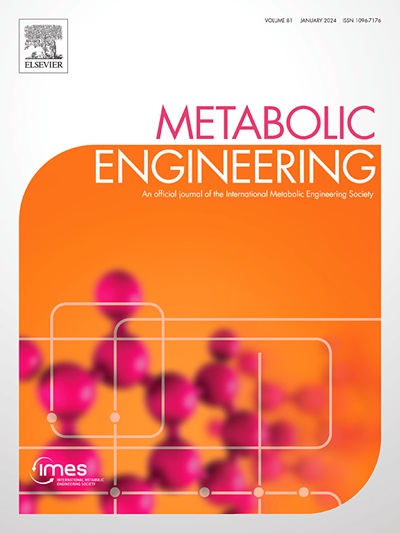Systems-level analysis provides insights on methanol-based production of l-glutamate and its decarboxylation product γ-aminobutyric acid by Bacillus methanolicus
IF 6.8
1区 生物学
Q1 BIOTECHNOLOGY & APPLIED MICROBIOLOGY
引用次数: 0
Abstract
Bacillus methanolicus is the next workhorse in biotechnology using methanol, an alternative and economical one-carbon feedstock that can be obtained directly from carbon dioxide, as both carbon and energy source for the production of value-added chemicals. The wild-type strain B. methanolicus MGA3 naturally overproduces l-glutamate in methanol-based fed-batch fermentations. Here we generated a B. methanolicus strain exhibiting enhanced l-glutamate production capability through induced mutagenesis. To showcase the potential of this mutant strain, further metabolic engineering enabled the production of γ-aminobutyric acid (GABA) directly from l-glutamate during methanol fed-batch fermentations. Using a systems-level analysis, encompassing whole-genome sequencing, RNA sequencing, fluxome analysis and genome-scale metabolic modelling, we were able to elucidate the metabolic and regulatory adaptations that sustain the biosynthesis of these products. The metabolism of the mutant strain specifically evolved to prioritize energy conservation and efficient carbon utilization, culminating in increased product formation. These results and insights provide a foundation for further rational metabolic engineering and bioprocess optimization, enhancing the industrial viability of B. methanolicus for sustainable production of l-glutamate and its derivatives.
系统级分析提供了甲醇芽孢杆菌以甲醇为基础生产l-谷氨酸及其脱羧产物γ-氨基丁酸的见解。
甲醇芽孢杆菌是使用甲醇的生物技术的下一个主力,甲醇是一种替代的经济的单碳原料,可以直接从二氧化碳中获得,作为生产增值化学品的碳和能源。野生型菌株methanolicus MGA3在以甲醇为基础的分批补料发酵中自然过量产生l-谷氨酸。在这里,我们通过诱变培养了一株甲醇双歧杆菌,该菌株具有增强的l-谷氨酸生产能力。为了展示该突变菌株的潜力,进一步的代谢工程使l-谷氨酸在甲醇补料分批发酵过程中直接产生γ-氨基丁酸(GABA)成为可能。通过系统级分析,包括全基因组测序、RNA测序、通量组分析和基因组级代谢模型,我们能够阐明维持这些产物生物合成的代谢和调节适应。突变菌株的代谢特别进化到优先考虑节能和有效的碳利用,最终增加了产物的形成。这些结果和见解为进一步合理的代谢工程和生物工艺优化提供了基础,提高了B. methanolicus可持续生产l-谷氨酸及其衍生物的工业活力。
本文章由计算机程序翻译,如有差异,请以英文原文为准。
求助全文
约1分钟内获得全文
求助全文
来源期刊

Metabolic engineering
工程技术-生物工程与应用微生物
CiteScore
15.60
自引率
6.00%
发文量
140
审稿时长
44 days
期刊介绍:
Metabolic Engineering (MBE) is a journal that focuses on publishing original research papers on the directed modulation of metabolic pathways for metabolite overproduction or the enhancement of cellular properties. It welcomes papers that describe the engineering of native pathways and the synthesis of heterologous pathways to convert microorganisms into microbial cell factories. The journal covers experimental, computational, and modeling approaches for understanding metabolic pathways and manipulating them through genetic, media, or environmental means. Effective exploration of metabolic pathways necessitates the use of molecular biology and biochemistry methods, as well as engineering techniques for modeling and data analysis. MBE serves as a platform for interdisciplinary research in fields such as biochemistry, molecular biology, applied microbiology, cellular physiology, cellular nutrition in health and disease, and biochemical engineering. The journal publishes various types of papers, including original research papers and review papers. It is indexed and abstracted in databases such as Scopus, Embase, EMBiology, Current Contents - Life Sciences and Clinical Medicine, Science Citation Index, PubMed/Medline, CAS and Biotechnology Citation Index.
 求助内容:
求助内容: 应助结果提醒方式:
应助结果提醒方式:


